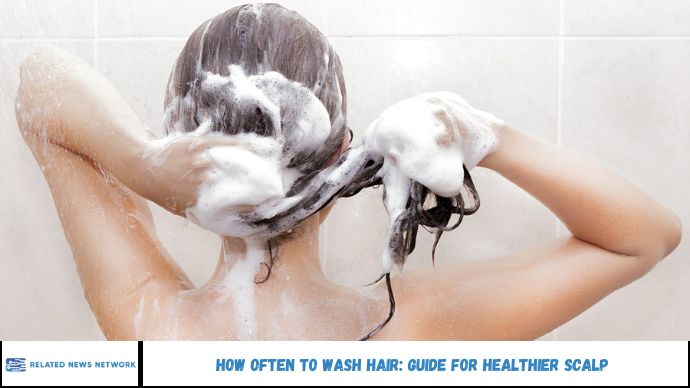How Often to Wash Hair: Guide for Healthier Scalp Is daily washing ruining your hair? Or is skipping too many wash days the real problem? With so much conflicting advice out there, knowing how often you should wash your hair can be confusing—and the answer isn’t one-size-fits-all.
According to a recent survey of over 2,000 women by Atomik Research, nearly half wash their hair just two to three times a week. What’s more, 44% of participants spend no more than 30 seconds shampooing their hair.
I’ve often encountered trichologists who recommend daily hair washing, yet this practice seems more common among men. The reason? For women with long hair, especially if it’s thick, curly, or difficult to manage, washing daily can feel time-consuming. As someone who fits that description, I’ve gone back and forth between different approaches.
Having bleached my hair every eight weeks, I’m usually tempted to skip a wash or two to avoid stripping it of its natural oils. But after speaking with trichologist Anabel Kingsley, I’m convinced this idea is a myth. She firmly believes that daily washing is crucial for maintaining scalp health, and skipping washes doesn’t provide any real benefits.
Kingsley also stresses the importance of using a shampoo specifically suited to your hair type. More importantly, she recommends spending at least a full minute shampooing and avoiding the temptation to use too much product at once, as it can lead to dullness. Her advice? Use a 50 pence-sized amount of shampoo and, instead of adding more product, add water to increase the lather. She compares haircare to skincare, pointing out that just as you wouldn’t skip cleansing your face, you shouldn’t skip washing your hair.
Since I started shampooing daily, I’ve noticed a significant improvement in my hair’s health—it’s shinier, thicker, and much easier to manage. Kingsley also advises against rubbing your scalp too vigorously, as this can cause tangles and breakage. Instead, focus on massaging the scalp while letting the water from the showerhead help distribute the shampoo down the hair shaft for even cleansing.
Abstract
How often you should wash your hair depends on several factors—scalp oil production, hair texture, styling products, and lifestyle habits. Washing too frequently can strip natural oils, while washing too little can lead to buildup and irritation. This guide provides expert-backed insights to help you develop a customized hair care routine based on what your hair actually needs.
Why Hair Washing Frequency Matters
Hair washing isn’t just about looking clean—it’s about keeping your scalp healthy and your hair strong. The scalp produces natural oils (sebum) that protect and nourish your hair. Wash too often, and you strip away those oils, leading to dryness, breakage, and irritation. Don’t wash enough, and oil, sweat, and product build up, potentially clogging hair follicles and causing scalp issues like dandruff or itching.
Key reasons it matters:
Style longevity: Knowing your wash rhythm helps you plan around events and style maintenance.
Scalp health: Balanced washing prevents oil buildup and supports healthy follicles.
Hair strength: Over-washing weakens the hair shaft, making it more prone to damage.
Product effectiveness: Clean hair and scalp help products like serums or treatments absorb better.
How Often to Wash Hair Based on Hair Type
1. Oily or Fine Hair: Every 1–2 Days
Fine or oily hair tends to show grease more quickly because sebum travels down the strands faster.
- Wash every other day, or daily if needed
- Use lightweight, clarifying shampoos
- Avoid heavy conditioners at the roots
2. Normal or Straight Hair: Every 2–3 Days
Normal hair can tolerate less frequent washing while still looking clean and feeling fresh.
- Wash every 2–3 days
- Choose a pH-balanced, sulfate-free shampoo
- Avoid dry shampoos for more than 1 day between washes
3. Curly or Coily Hair: Every 4–7 Days
Curly textures are naturally drier because oil takes longer to travel down the hair shaft.
- Wash once or twice per week
- Use a sulfate-free, moisturizing shampoo
- Co-washing (cleansing with conditioner) can be a good in-between option
4. Dry or Damaged Hair: Every 5–7 Days
Color-treated, heat-styled, or chemically processed hair needs gentle handling.
- Limit washing to once a week
- Always use a nourishing, bond-repairing shampoo
- Add weekly masks or pre-shampoo oil treatments
5. Active Lifestyles: Adjust Based on Sweat and Product Use
If you work out frequently or use lots of styling products, you may need to rinse or cleanse more often.
- Try a water-only rinse after light workouts
- Use micellar or scalp-refreshing shampoos for post-exercise wash days
- Avoid excessive scrubbing which can irritate the scalp
What Happens If You Wash Too Often?
Over-washing can lead to:
- Stripped natural oils
- Dry, brittle strands
- Irritated or flaky scalp
- Faded hair color
What Happens If You Wash Too Infrequently?
Under-washing may cause:
- Oil and product buildup
- Dandruff-like flakes
- Scalp itchiness or odor
- Clogged follicles or breakouts near the scalp
Quick Hair Washing Tips
- Always condition after shampooing to rebalance moisture
- Rinse with lukewarm or cool water to seal the cuticle
- Focus shampoo on the scalp, not the ends
- Use a scalp brush for a deeper cleanse once a week
FAQs
1. Is it okay to wash hair every day?
Only if you have very oily or fine hair. Otherwise, daily washing may dry out your scalp.
2. Can not washing my hair cause hair loss?
Infrequent washing may cause buildup and clogged follicles, which can contribute to hair thinning over time.
3. Should curly hair be washed less often?
Yes, curly and coily textures need fewer washes to retain natural oils and prevent frizz.
4. What if I exercise every day?
You can rinse with water or use a mild cleansing spray on non-wash days to refresh your scalp.
5. Is dry shampoo a replacement for washing?
No. It’s a temporary fix. Overuse can lead to scalp buildup and irritation.
6. How do I know if I’m washing too much or too little?
If your scalp feels itchy, oily too soon, or your ends feel dry, it may be time to adjust your routine.
Conclusion
When it comes to how often you should wash your hair, there’s no universal answer. Your routine should be tailored to your hair type, lifestyle, and how your scalp reacts. Striking the right balance promotes healthier strands, better manageability, and a scalp environment that supports long-term hair growth.









